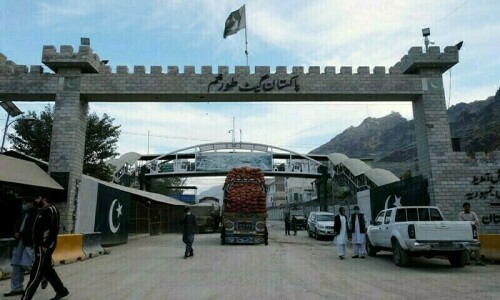ISLAMABAD: With excuses aplenty for a potential blow to democracy, and ignoring boycott by two religious parties, parliament passed on Tuesday two key government bills, amending the constitution and the Army Act to try civilian terror suspects in military courts.
As the unanimous vote on both the Constitution (Twenty-first Amendment) Bill and the Pakistan Army (Amendment) Bill was completed in both houses of parliament, Prime Minister Nawaz Sharif said in a speech to the Senate that more laws were on the way for the implementation of the 20-point National Action Plan against terrorism approved by a meeting of politicians he convened last week.
He also called for setting up more courts under the Protection of Pakistan Act enacted last year to try terrorism suspects who could not be tried by military courts.
PPP Senator Raza Rabbani says he ‘never felt so ashamed as today’
The two bills were first passed by the National Assembly with four amendments each, a day after objections by the government-allied Jamiat Ulema-i-Islam (JUI-F) and the opposition Jamaat-i-Islami to some passages in the rafts referring to terrorist groups operating in the name of religion or a sect torpedoed what was hailed as a grand national consensus achieved last week.
Hours later, the bills were taken to the Senate which quickly adopted them unchanged in a sitting marked by a sentimental speech by the parliamentary leader of the opposition PPP, Raza Rabbani, who said in choked voice that during his time in the Senate he “never felt so ashamed as today” in voting for military courts.
But the man, who steered the landmark Eighteenth Amendment during the previous PPP-led government, said now it was up to him to determine his future course as he sat back on his seat only briefly before leaving the house.
The JUI-F and the Jamaat boycotted the National Assembly sitting after the government refused to accept their demand for the deletion of references to groups threatening the country’s security and raising insurgency “using the name of religion or a sect”. The JUI-F, which seemed risking the jobs of its two ministers in the prime minister’s cabinet, was left alone in staying away from the Senate where the JI has no representation.
Two other government allies, Pakistan Muslim League-F and one-seat Pakistan Muslim League-Zia whose leader had supported the demand of the JUI-F and Jamaat, did not join their boycott.
The present amendment to the constitution, whose objective of giving a constitutional cover to the military courts for trying civilians to undo a bar ordered by the Supreme Court 15 years ago, is the first passed by the present parliament – following three by the previous one, including the landmark Eighteenth Amendment that gave more democracy and provincial autonomy.
The latest amendment, brought at the behest of the military in reaction to the Dec 16 terrorist attack on an army public school in Peshawar that killed 149 students and staff, revived memories of perceived excesses of military courts set up by the country’s military rulers and was seen by critics as a step backwards that could undermine parliament, democracy and judiciary.
While all the four amendments, moved by Law, Justice and Human Rights Minister Senator Pervaiz Rashid, to the constitution amendment bill improved the draft’s language, two of the four in the bill amending the Pakistan Army Act of 1952 made two substantive changes.
OVERRIDING EFFECT: One of them gives an overriding effect to the second bill’s clauses over anything contained in any other law in force for the time being and said “in case of any conflict with the provisions of any other law, provisions of this act shall prevail to the extent of inconsistency”.
Another amendment to the same bill removes a provision of the original draft that would have allowed the law to be extended beyond a limit of two years by a resolution passed by each house of parliament, making it clear that it would remain in force only for two years as would the new constitution amendment, after the period of their enactments starts with a formal assent by President Mamnoon Hussain.
In the absence of the opposition Pakistan Tehreek-i-Insaf, which has boycotted the National Assembly after sending resignations of more than 30 of its members, the constitution amendment was passed by 247-0, which was more than the required two-thirds of the total membership of the 342-seat house, through what is called “division” in which lawmakers supporting or opposing a bill have to sign separate registers.
The Senate vote, conducted in the same manner, came to 78-0, also more than the required two-thirds in the 104-seat house.
Unlike Mr Rabbani, his party colleague, Leader of Opposition Khursheed Ahmed Shah spoke more softly in the National Assembly to justify his party’s “painful decision” to support military courts, saying the overriding aim was to protect people’s lives from terrorists.
He said he was sure the military courts would follow the constitution and punish terrorists without discriminating between those taught by a madressah or a grammar school.
His opposite number in the opposition-dominated Senate, PPP’s Aitzaz Ahsan called it a “difficult choice” for his party and for himself after decades of opposing militarisation. But he said it was wrong to say that because Army Chief General Raheel Sharif was at last Friday’s conference of politicians called by the prime minister and “we buckled under”, and added: “We did not.”
But after describing how he had to persuade his party colleagues to vote for the move and recalling the death of 15-year-old namesake, Aitzaz Hassan, while tackling a suicide bomber near Hangu town of Khyber Pakhtunkhwa a year ago, he said “a little bit of me Aitzaz Ahsan died today”.
Sentor Hasil Bizenjo of the government-allied Balochistan-based National Party called the vote taking a “gulp of poison” after which, he said there should be no dilly-allying in dealing with terrorism and differentiating between “good and bad” terrorists.
FIGHT WITH FULL FORCE: Prime Minister Nawaz Sharif, in his Senate speech, said he hoped the new law would help eliminate what he called lawlessness of the past 65 years.
He called for fighting “this war with full force” and moving ahead forcefully. Otherwise, he said: “There is be no use for a man like me to be in the chair.”
Published in Dawn, January 7th, 2015
On a mobile phone? Get the Dawn Mobile App: Apple Store | Google Play
















































